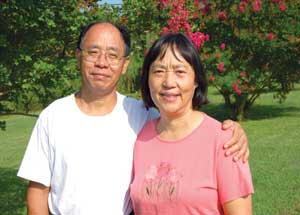Editorial
Front Page - Friday, July 30, 2010
Chinese association preserves traditions, creates cultural connections
David Laprad
 Dr. Ling Jun Wang is a physics professor at the University of Tennessee at Chattanooga, and his wife, Bihua Liu Wang, teaches conversational Chinese. They are both members of the Chattanooga Chinese Association, a nonprofit organization dedicated to promoting and preserving Chinese traditions, customs, culture and language in the local Chinese community.
- David Laprad
Dr. Ling Jun Wang is a physics professor at the University of Tennessee at Chattanooga, and his wife, Bihua Liu Wang, teaches conversational Chinese. They are both members of the Chattanooga Chinese Association, a nonprofit organization dedicated to promoting and preserving Chinese traditions, customs, culture and language in the local Chinese community.
- David Laprad
Dr. Ling Jun Wang, a physics professor at the University of Tennessee at Chattanooga, has clear childhood memories of celebrating the New Year in China.
“Everyone did farm work, so in the winter, you would visit your family since there was nothing else do to. Transportation was inadequate, so we would walk for tens of miles to visit our relatives,” he says.
Seated next to his wife, Bihua Liu Wang, in the dining area of their Hixson, Tenn., home, Dr. Wang recalls another New Year’s tradition, or “unwritten law,” as he calls it.
“On the first day of the New Year, you would visit every family in the village and wish them a happy New Year, even your enemy. If you didn’t do that, you would have bad luck all year. I think the ancient philosophers borrowed the power of religion and superstition to force people to take a peace,” he says.
Unfortunately, as Chinese people moved to the U.S., they forgot about these traditions, Dr. Wang says.
As a 31-year resident of the United States, Dr. Wang no longer observes these traditions, either, even though he says they remain “deeply rooted” in his mind. However, he and other Chinese people living in and around Scenic City promote and preserve other customs, as well as their language and culture, through the Chattanooga Chinese Association.
As one of the many organizations that serve the different ethnic groups in Scenic City, the Chattanooga Chinese Association attracts members from the approximately 300 families that make up the local Chinese community. Dr. Wang says the association has no political or religious affiliations, but is merely a means by which local Chinese people can gather together to celebrate their rich heritage.
“When you have the same origins, you have a natural desire to get together on a regular basis. It gives everyone a sense of their common roots,” Dr. Wang says.
The local Chinese Assoc-
iation holds four gatherings a year, the first of which is the Chinese New Year, which usually falls in January or February. In the summer, the organization comes together during the Dragon Boat Festival to enjoy traditional food. Then, in August, everyone meets to celebrate an important festival in China that marks the end of the harvest.
“The hot weather is done, and the hard work is over, so you can feel the joy of a break. Because people have just finished the harvest, you have a lot of fresh vegetables and fruits, so everyone gets together and enjoys the food. That’s also the day when the moon is the largest and the brightest, because it’s the closest to the Earth, so we also eat what we call moon cakes,” he says.
The association also celebrates Christmas.
In addition to organizing activities for its members, the association works to introduce Chattanooga residents to different aspects of Chinese culture, and to educate students and members of the business community. Its members have performed traditional music, dances and martial arts routines during cultural festivals, and brought the same to schools and various groups around town. In addition, numerous organizations have invited Dr. Wang to give talks about Chinese culture. And not only has Dr. Wang taught a course at UTC about the history of U.S.-Chinese relations, his wife teaches conversational Chinese.
“I have spent as much time in the States as I did in China, so I know both sides,” Dr. Wang says. “I came from China – and I love China – but I am settled here. This is where my children will find their fortune or misfortune, so I can be impartial.”
Dr. Wang came to the U.S. in 1979, just after the U.S. and China initiated diplomatic relations. He was studying at the Institute of Theoretical Physics at Academia Sinica in Beijing when Southeastern Massachusetts University offered him a graduate teaching assistantship. Later, he secured work in the U.S., and his wife and son joined him in 1985. Today, their daughter, who was born and raised in Tennessee, teaches Chinese at UTC.
“In the future, as people forget about the ideological barriers between the two countries, and as the U.S. and China do more business with each other, you will see a greater need for (effective) communication. That is why Chinese is entering our colleges and high schools,” Dr. Wang says.
Dr. Wang also expects there will be an ever-greater interest in the U.S. in learning about the 5,000-year-old civilization located across the Pacific Ocean.
“The U.S. is the strongest in military, and economically, but that doesn’t mean the Chinese culture doesn’t have value,” he says.
To learn more about the Chattanooga Chinese Association, and to contact its governing members, including Dr. Wang, visit www.cca-ccs.org.
|
|